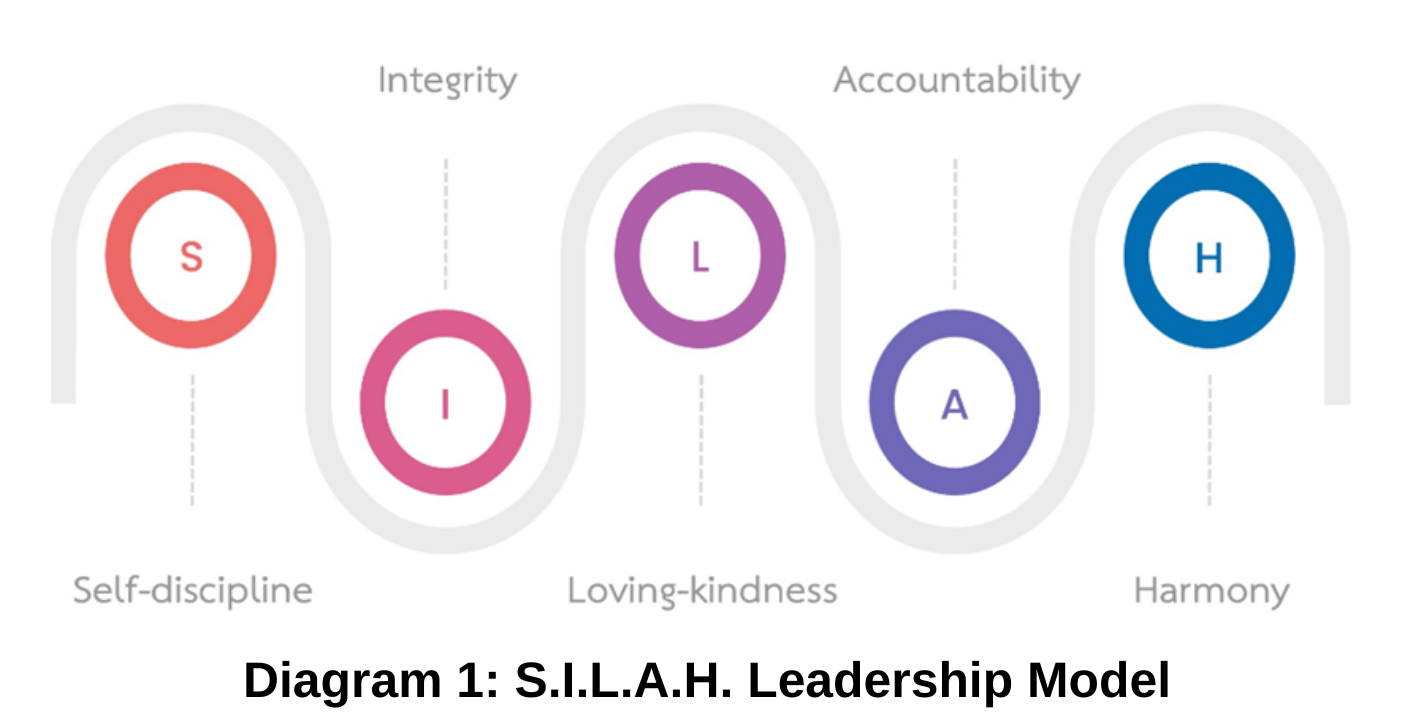Business Administration Based on the Practice of Sila Parami
Keywords:
Leadership, Business Administration, Sila ParamiAbstract
This academic article aims to analyze the concept of Sila Parami (Perfection of Morality) in Theravada Buddhism and apply it as an ethical framework for contemporary business administration. The central argument posits that Sila is not merely a personal moral discipline but can be transformed into a system of organizational ethics that fosters long-term sustainability. The article explores the meaning and three progressive levels of Sila Parami - basic, intermediate, and ultimate - and integrates these with modern leadership theories such as Ethical Leadership, Authentic Leadership, and Servant Leadership. The findings indicate that business leadership rooted in Sila Parami cultivates self-discipline, integrity, transparency, compassion, and accountability toward all stakeholders. A key contribution of this article is the development of the S.I.L.A.H. Leadership Model, Derived from the synthesis of Sla-parami (the perfection of morality) and the concept of ethical leadership. comprising five core elements : Self-discipline, Integrity, Loving-kindness, Accountability, and Harmony. This model illustrates how moral cultivation within Buddhist practice can guide organizational behavior, ethical decision-making, and sustainable leadership in complex and volatile environments. In conclusion, the article proposes that in an era marked by uncertainty and moral challenges, business management must be revitalized from within. Sila Parami offers a spiritual and ethical foundation that harmonizes economic objectives with moral responsibility - laying the groundwork for a more compassionate and trustworthy corporate culture.
References
กาญจนา ศรีปัญญา. (2565). ผู้นำกับศีลธรรมในสังคมเปลี่ยนผ่าน : การสังเคราะห์เชิงพุทธปรัชญา. วารสารวิถีธรรมวิจัย, 17(2), 23–38.
ธรรมทัศน์. (2560). ทศบารมี ในพุทธศาสนาเถรวาท. [ออนไลน์]. แหล่งที่มา : https://dhammayut.org [20 มิถุนายน 2568].
ปิยะพร ประทีป ณ ถลาง. (2564). ภาวะผู้นำและการจัดการเชิงคุณธรรมในองค์กรสมัยใหม่. วารสารธรรมส่องชีวิต, 10(1), 99–113.
พระพรหมคุณาภรณ์ (ป.อ. ปยุตฺโต). (2543). พุทธธรรม : ฉบับปรับขยาย. กรุงเทพฯ : มหาวิทยาลัยมหาจุฬาลงกรณราชวิทยาลัย.
พระมหาวุฒิชัย วชิรเมธี. (2557). ผู้นำยุคใหม่ในโลกแห่งการเปลี่ยนแปลง. เชียงราย : สำนักพิมพ์ DMG.
พระมหาสำราญ านุตฺตโม. (2566). การพัฒนาภาวะผู้นำเชิงพุทธในศตวรรษที่ 21. วารสารพุทธนวัตกรรมและการจัดการ, 6(6), 198–212.
พระมหาหรรษา ธมฺมหาโส. (2561). จริยศาสตร์เชิงพุทธ : การตีความในสังคมร่วมสมัย. กรุงเทพฯ : มูลนิธิพุทธธรรม.
สุพจน์ พงศ์พุฒิคุณ. (2563). การนำหลักธรรมพุทธมาใช้ในการบริหารจัดการสมัยใหม่. วารสารปริยัติธรรม, 35(1), 45–57.
Avolio, B. J., & Gardner, W. L. (2005). Authentic leadership development : Getting to the root of positive forms of leadership. The Leadership Quarterly, 16(3), 315–338.
Bass, B. M., & Steidlmeier, P. (1999). Ethics, character, and authentic transformational leadership behavior. The Leadership Quarterly, 10(2), 181–217.
Boyatzis, R. E. (2006). Intentional change theory from a complexity perspective. Journal of Management Development, 25(7), 607–623.
Brown, M. E., & Treviño, L. K. (2006). Ethical leadership : A review and future directions. The Leadership Quarterly, 17(6), 595–616.
Gethin, R. (1998). The foundations of Buddhism. Oxford University Press.
Greenleaf, R. K. (1977). Servant leadership : A journey into the nature of legitimate power and greatness. Paulist Press.
Herzberg, F. (1968). One more time: How do you motivate employees? Harvard Business Review, 46(1), 53–62.
Maslow, A. H. (1954). Motivation and personality. New York: Harper & Row.
Phuttipong, K. (2021). Leadership ethics and Buddhist precepts : A philosophical synthesis [Master’s thesis, Thammasat University]. Thammasat e-Thesis. [ออนไลน์]. แหล่งที่มา: https://ethesisarchive.library.tu.ac.th/thesis/2021/TU_2021_5906031611_15788_20600.pdf [20 มิถุนายน 2568].

Downloads
Published
How to Cite
Issue
Section
License
Copyright (c) 2025 Institute of Sufficiency Journal

This work is licensed under a Creative Commons Attribution-NonCommercial-NoDerivatives 4.0 International License.



